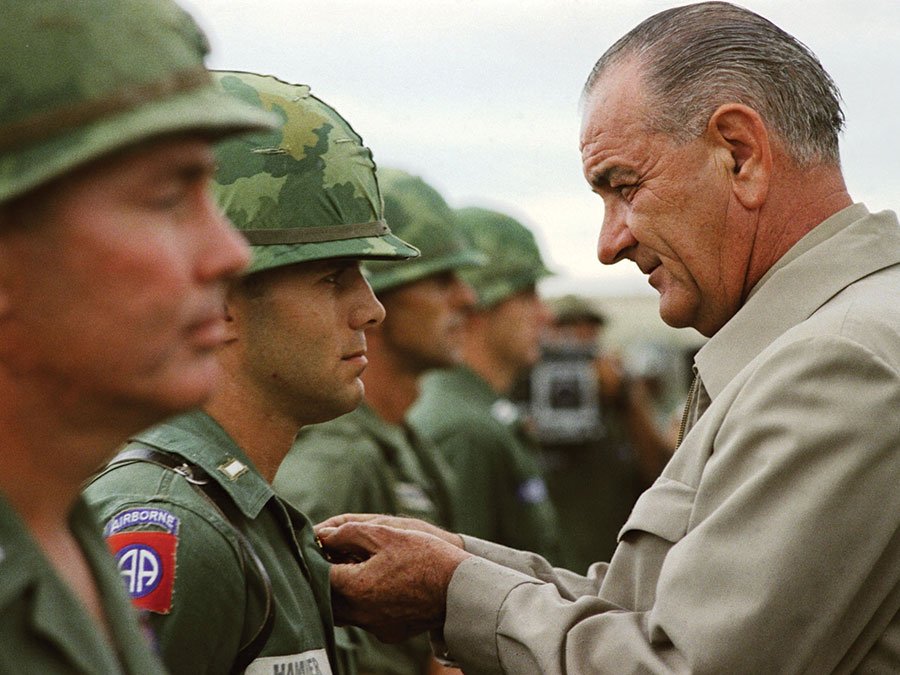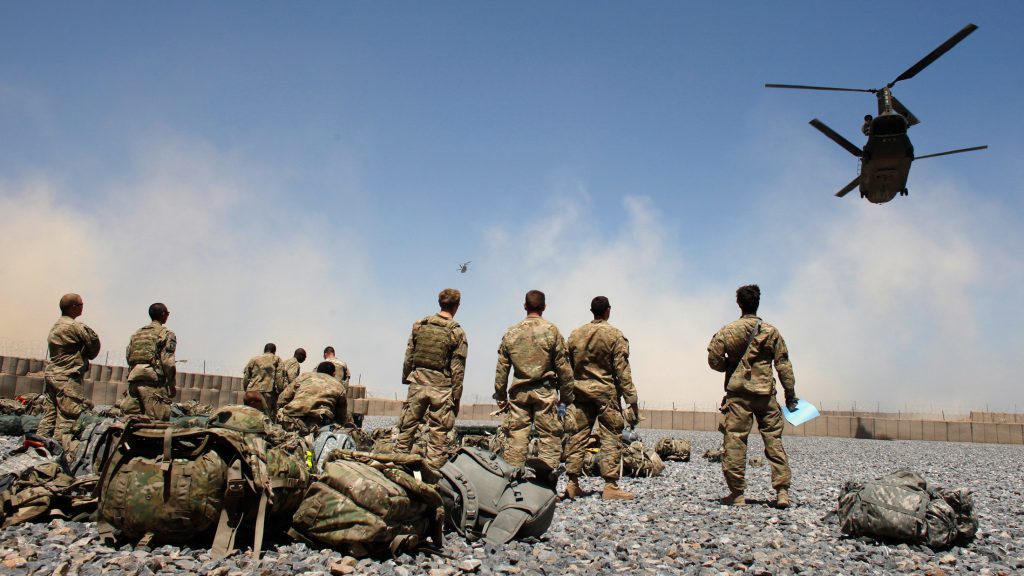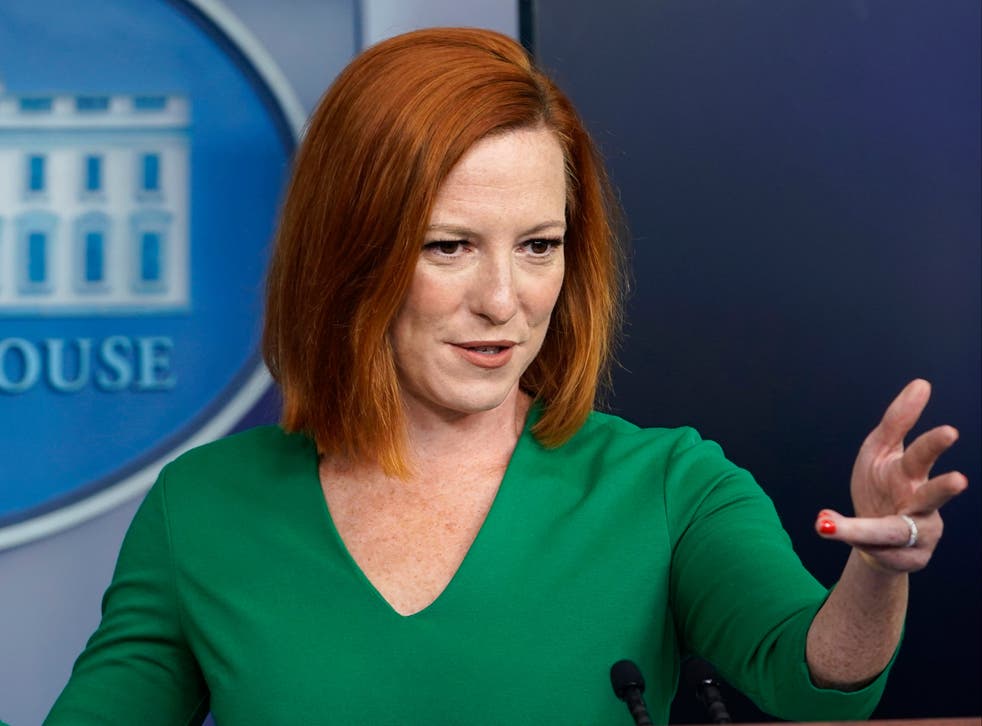Unless you served or protested, the ignominious end of America’s tragic experience in Vietnam, a war driven by myth, hubris, political calculation and ignorance, is at best a distant memory for most of us. It’s no memory at all for Americans born after 1975, even if our history books remind us that more than 58,000 of our fellow citizens paid the ultimate price for a mistake.
America’s role in Vietnam directly bedeviled and haunted five presidents, ultimately driving two – Johnson and Nixon – from office. Every president since, whether they admit it or not, lives with the Vietnam legacy.
Lyndon Johnson was a political product of a vast, injurious and phony debate over “who lost Red China” to Communism in the 1950’s. When Johnson reached the Oval Office in 1963, he was determined not to be judged as having “lost Vietnam.”
Johnson won a landslide election in 1964 against a candidate – Barry Goldwater – who spoke casually of using nuclear weapons to win a jungle war in Southeast Asia. After that election, Johnson began the long and tragic slog to make a Vietnamese war, that had once been a French war, into an American war.

The complicated, crass, brilliant Texan oozed cornpone, but he lived and breathed what he called “that bitch of a war,” a years-long struggle that derailed his Great Society and has permanently defined his legacy.
The great economist John Kenneth Galbraith once remarked that a friend told him had it not been for Vietnam, Johnson would be considered a great president. Galbraith replied: “If it weren’t for the Alps, Switzerland would be a flat country.” That war sticks to LBJ like Texas barbecue sauce sticks to a napkin.
Most Americans would say that Nixon was forced from the White House by the crimes of Watergate, which, of course, is correct. But those Watergate crimes had roots in Nixon’s reaction to the Pentagon Papers, an exhaustive account of the American involvement in Vietnam that was leaked to the New York Times in 1971. The papers were a damning indictment of the mendacity, political maneuvering and American delusion that led Dwight Eisenhower, then John Kennedy and finally Johnson to burrow ever deeper into a futile “land war in Asia.”
Had Nixon been as smart a political operative as he thought himself to be he would have used the evidence contained in the leaked Pentagon Papers to discredit the two previous Democratic administrations. The papers were not critical of him, after all. He had inherited the mess. But Nixon was Nixon.
As a brilliant new podcast – “Nixon at War” explains, “Nixon’s long festering paranoia and indignation zeroe(d) in on two of his most despised ‘enemies’ – the press, for publishing the government’s closely held secrets, and the leakers within his own deep state, now personified by Daniel Ellsberg, for the growing threat he believes they pose to his own buried secrets.”
Nixon ordered his political spies to break into Ellsberg’s – the leaker – psychiatrist office in search of dirt. Viola! The seeds of the Watergate break in are planted, the fate of Nixon cast. Were it not for the break ins … well, you know.
Wise voices warning of American folly in Vietnam were everywhere to be found in the 1950’s and 1960’s. During the Eisenhower Administration, Montana Senator Mike Mansfield foresaw that only the Vietnamese could create a stable, democratic government, and they certainly couldn’t accomplish that if millions of Vietnamese thought the United States was merely a colonial substitute for the French, who retreated after their own dismal Vietnam failure.
Others like Idaho’s Frank Church, Oregon’s Mark Hatfield and South Dakota’s George McGovern saw clearly where American hubris was headed. The diplomat George Kennan testified before the Senate Foreign Relations Committee in 1966 – back when the committee actually had serious hearings about American foreign policy – and declared that the United States was deluded if it thought it had legitimate national security interests in Vietnam. We should get out, Kennan said.
Vermont Republican Senator George Aiken, a flinty New Englander not given to mincing words, had a blunt suggestion: declare victory and leave. We didn’t, until it was too late.
Now, a generation and more on, we have a new reckoning with the curious American belief that our arms and money and good intentions can shape a country far away for a people who have very different ideas. Our longest war – another American war of hubris – is winding down in Afghanistan, and if history is not precisely repeating it is certainly rhyming.

As the Washington Post reported this week on a new secret account of the Afghan War. Ironically the Post kept printing the Pentagon Papers when the Times was enjoined from doing so, further fueling Nixon’s paranoia. The document reeks of the same stench of fabrication and dishonesty that marks the American experience in Vietnam.
Among the revelations are details of a heretofore unknown suicide bomber attack, aimed at then vice-president Dick Cheney. The Pentagon and Bush Administration flat out lied about the attack, and “how close the insurgents had come to harming Cheney.” In the wake of this lying came more lying, and “the U.S. military sank deeper into a pattern of deceiving the public about many facets of the war, from discrete events to the big picture. What began as selective, self-serving disclosures after the 2001 invasion gradually hardened into willful distortions and, eventually, flat-out fabrications.”
The Afghan Papers will be published in book form soon. The Post said in a preview: “The interviews and documents, many of them previously unpublished, show how the administrations of Presidents George W. Bush, Barack Obama and Donald Trump hid the truth for two decades: They were slowly losing a war that Americans once overwhelmingly supported. Instead, political and military leaders chose to bury their mistakes and let the war drift, culminating in President Biden’s decision this year to withdraw from Afghanistan, with the Taliban more powerful than at any point since the 2001 invasion.”
To Joe Biden’s credit, he made the tough call to finally end a war that America should not have fought and could not win.
Now, there will be an awful reckoning on the ground in Afghanistan, the graveyard of empires. The murderous Taliban will control most of the country, thousands of lives, many of them American, and billions in American treasure will have been squandered. It was all inevitable.
We think we can bomb and purchase our way to democracy in a country that has never had democracy and may not be capable of creating it. We try again and again to re-create the world we want only to fail.
You might think we’d learn. But we never do.
—–0—–
Additional Reading:
Some additional items you may find of interest…
How The Pandemic Now Ends
A must read from The Atlantic’s Ed Yong.
“In simple terms, many people who caught the original virus didn’t pass it to anyone, but most people who catch Delta create clusters of infection. That partly explains why cases have risen so explosively. It also means that the virus will almost certainly be a permanent part of our lives, even as vaccines blunt its ability to cause death and severe disease.”
Yong won great recognition for his reporting on the pandemic. This piece is well worth your time.
And here is related piece by Scott Galloway that I found very interesting.
How a Trail in Rural Oregon Became a Target for Far Right Extremists
Another great piece of reporting from Leah Sottile in High Country News about how a trail has divided an Oregon community.
“In a state where politics is dominated by the urban-rural divide, it’s as if the proposed Yamhill County trail is the actual place — the exact line — where that divide begins.”
Press Secretary Jen Psaki is Good At Mending Fences. Just Don’t Call Her Nice
The best political job I ever had was the five years I spent as press secretary to candidate and then Idaho Governor Cecil D. Andrus. The job, at least with the right boss, puts one daily in the midst of big events. You deal with interesting people – reporters, too. (Inside joke.) You travel with the politician. You may even have a chance to influence policy.
I’ve made an informal study of people who have been or are press secretaries. I’m convinced that Jan Psaki, the current White House press secretary, is one of the very best to ever hold the position.

“When Psaki first appeared in the press briefing room, in January 2021, there was a collective swoon from roughly half the country. This was largely due to what she was not doing: berating the assembled reporters, griping about CNN’s coverage of a presidential tweet, or spouting flagrant, easily disprovable lies. Like her boss, Psaki was being graded on a curve. The New Yorker writer Jelani Cobb tweeted, ‘I really should not be impressed with a calm, professional, and factual press briefing, but I am where I am.'”
Here’s the link to the piece in Vogue:
Brett Kavanaugh Without Tears
Journalist Jackie Calmes has a new book that revisits the story of Supreme Court Justice Brett Kavanaugh. You might have thought you knew everything there was to know about him – of perhaps everything you wanted to know.
I found this excerpt both fascinating and infuriating.
“Kavanaugh emerged from Yale Law School, two appellate clerkships, an internship with the Solicitor General, and a third clerkship at the Supreme Court as a deeply conservative but not especially partisan young man. That changed after the Solicitor General Kavanaugh worked for, Ken Starr, was appointed independent counsel to investigate the Clintons and an Arkansas real estate investment called Whitewater. In 1994, Starr invited Kavanaugh to join him for what he promised would be a short gig. It lasted nearly four years.”
Giants? World Series, Anyone?
I sure hope this doesn’t jinks my favorite baseball team, but...Dieter Kurtenbach writes in the San Jose Mercury News what I’ve been thinking, but can’t bring myself to say out loud.

I kind of checked out of following the great game last summer, but this San Francisco Giants team has been something else.
“Now, I wish I knew exactly what it was that makes the Giants a true contender,” Kurtenbach wrote this week. “Call it gumption, togetherness, a never-say-never-ness — there’s something special about this team.”
Let’s end with a good news story.
Thanks, as always, for following along. Stay well.





























